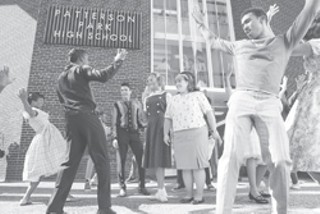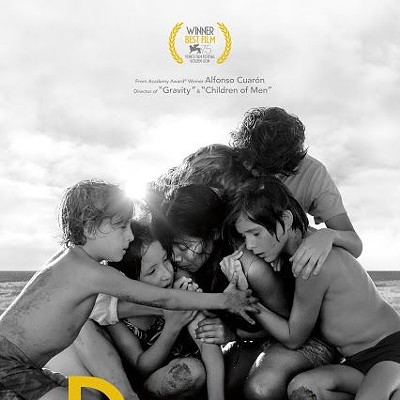HAIRSPRAY ***1/2
For over a decade, John Waters had been unleashing some of the most outrageous movies ever made before deciding to tentatively test the waters of mainstream cinema -- or at least as mainstream as this flagrantly maverick filmmaker could attempt. His tepid 1981 offering Polyester was met with a stone wall of shrugs, even with the gimmick of being presented in Odorama (patrons were given scratch ‘n’ sniff cards that, if memory serves, stank like sour milk no matter what number was scratched off). But his 1988 offering, Hairspray, was another story: An instant critical and cult success, it eventually was turned into a smash Broadway musical and has now been brought back to the screen, with the added songs intact. It’s one of this summer’s few out-and-out delights, smoothing out but never compromising the issues that made Waters’ original film such a quirky delight. An ode to being different, Hairspray stars delightful newcomer Nikki Blonsky as Tracy Turnblad, an overweight teenager who won’t let her pleasantly plump figure get in the way of following her dream in 1960s Baltimore. And her dream is to become famous, preferably by showing off her dance moves on The Corny Collins Show, a local American Bandstand-style program that’s a hit with the kids. Her obese mom Edna (John Travolta in drag) is afraid her daughter will get hurt, but her dad Wilbur (a warm Christopher Walken) encourages her to go for it. Impressing Corny Collins himself (X-Men’s James Marsden), not to mention the show’s reigning pinup star Link Larkin (Zac Efron), Tracy does indeed land a coveted spot on the show, much to the disgust of Link’s girlfriend Amber Von Tussle (Brittany Snow) and her wicked mom Velma (Michelle Pfeiffer). The movie’s first and foremost a musical, and director Adam Shankman does a commendable job of filming the song-and-dance routines in a manner that accentuates the total skills involved (the noticeable lack of rapid MTV-style cuts is greatly appreciated). The weakest cast link is, perhaps surprisingly, Travolta, who may have enjoyed returning to his movie musical roots (Saturday Night Fever, Grease) but nevertheless fails to adequately fill the large shoes of the late Divine, who was simply,well, divine in Waters’ ‘88 screen version.
Harry Potter and the Order of the Phoenix ***
Those who like their Potter black will find much to appreciate in Harry Potter and the Order of the Phoenix, the fifth and moodiest of the J.K. Rowling adaptations to date. Chris Columbus’ first two entries -- both underrated -- focused mainly on fun and games, with the subsequent installments helmed by Alfonso Cuaron and Mike Newell taking on decidedly darker dimensions. The level of malevolence is raised even further here, thanks to the taut direction by unknown David Yates and a forceful performance by series lead Daniel Radcliffe. Between the last film (Goblet of Fire) and this new one, it’s startling to note how the actor and the character seem to have aged multiple years, a testament to the maturity and intensity that Radcliffe brings to the role. Villainy abounds in The Order of the Phoenix, with Lord Voldemort (Ralph Fiennes) haunting Harry’s every move, a fluttering fascist named Dolores Umbridge (Imelda Staunton) taking over the Hogwarts school, and an escaped prisoner known as Bellatrix Lestrange (Helena Bonham Carter) arriving late to kill off a popular character. Add to those threats Harry’s issues of abandonment and estrangement, and it’s no wonder the lad can’t keep those roiling emotions in check. In this respect, Phoenix operates not only as a story-specific fantasy flick but also as a universal teen angst tale, a far-flung Rebel Without a Cause in which the protagonist tries to comprehend the adult world he’s on the verge of entering while simultaneously struggling to cut the umbilical cord of childhood. Because of this slant, this emerges as the most dramatic of the five films to date, with betrayals coming from both memories (a flashback involving Harry’s dad and professor Severus Snape, again played by Alan Rickman, is startling in its implications) and mortals (Judas, must you betray me with a kiss?) only serving to drive the nail into Harry’s splintered psyche even deeper. Fortunately, Harry’s friends won’t leave him alone -- even when he’s surly toward them -- and he receives a much-needed support system from best buds Ron Weasley (Grint) and Hermione Granger (Watson) as well as a seemingly spacy blonde named Luna Lovegood (newcomer Evanna Lynch, wonderfully embodying the most interesting of the new characters).
You Kill Me ***
Perhaps not since Jack Nicholson in 1985’s Prizzi’s Honor has any actor so solidly struck the funny bone portraying a hit man as Ben Kingsley does in You Kill Me. The film’s premise initially makes it sound like a cutesy variation on the type of pseudo-hip crime flicks churned out on a monthly basis by Tarantino wannabes: Mob assassin Frank Falenczyk (Kingsley) was once at the top of his game, but in recent times he’s fallen so deeply under the spell of the bottle that he now drunkenly sleeps through his assignments. His boss (Philip Baker Hall) sends him to San Francisco to sober up; there, he lands a job at a funeral home, attends AA meetings under the tutelage of a gay sponsor (Luke Wilson), and strikes up an offbeat relationship with a sharp-tongued woman (Tea Leoni) who doesn’t seem particularly disturbed by his line of work. You Kill Me feels like a lightweight throwaway, but it remains in the memory longer than expected, thanks to the freewheeling direction by John Dahl (The Last Seduction), a killer-quip-packed script by the team of Christopher Markus and Stephen McFeely (the guys adapting the family-friendly Chronicles of Narnia franchise to the screen!), and a sterling cast fronted by a perfectly cast Kingsley, who in this film manages to elicit chuckles with just his terse facial expressions.
License to Wed *
Mandy Moore has managed to costar in the two worst films of 2007 (thus far), yet let’s not be in a hurry to pick up those stones and torches. Truth be told, Moore is turning out to be a welcome screen presence -- far better than most recent singers-turned-actors -- and she’s hardly to blame for either the rancid Because I Said So or the toxic-waste comedy License to Wed. The heir presumptive to last summer’s You, Me and Dupree, this new film, offensive in its idiocy, similarly places loathsome characters in absurd situations that are meant to give off a funky black-comedy vibe yet instead reek only of desperation as well as the limitations of comically challenged minds. Under the disinterested supervision of director Ken Kwapis, four writers jerry-rig a premise that finds newly engaged couple Ben Murphy (John Krasinski) and Sadie Jones (Moore) forced to pass a marriage preparation course supervised by the Jones family’s longtime minister, Reverend Frank (Robin Williams). Along the way, Reverend Frank, aided by his young apprentice (Josh Flitter, as annoying here as he was in Nancy Drew), bugs the couple’s bedroom, embarrasses Ben in front of his future in-laws, and drives Sadie away from her fiance. Sharp scripting could have given Frank the balance required to make him an apt comic foil, but here he’s simply creepy, a problem expounded by the casting of Robin Williams. Williams is in his manic, whoring mode here, an approach well past its expiration date in terms of actually resembling anything funny or topical. (One bit finds Williams making a joke about O.J. Simpson; heck, why not cracks about the Pentagon Papers or Rosie the Riveter or even the invention of the light bulb?) Williams has made so many one-star comedies that it’s impossible to keep count at this point. But rest assured that there’s a multiplex in hell that screens them on a perpetual loop.
Live Free or Die Hard **1/2
For whatever reason -- fat paycheck, wavering career, poor choice of available roles -- Bruce Willis has elected to return to his signature role as John McClane, and the end result is better than most years-after-the-fact sequels (Rocky Balboa, The Evening Star, Crocodile Dundee In Los Angeles). The twist here is that aging detective McClane, an old-fashioned guy used to 20th century modes of expression and ideas, finds himself battling cyber-terrorists who threaten to shut down the entire United States with a few strokes of a keyboard. The movie’s billing itself as the story of an “analog” cop living in a “digital” age, and we all know what that means. No mouse pads or monitors for our hero; instead, it’s all flying fists, rapid-fire weaponry and explosions. Lots of explosions. Yet even director Len Wiseman and scripter Mark Bomback don’t have complete faith in the cop’s old-fashioned heroics since they saddle him with a sidekick who’s a genius when it comes to computers. Matt Farrell ( Justin Long, the “Mac” guy in those ubiquitous Apple commercials) is a Neo-inspired hacker who inadvertently helps the villain (an effective Timothy Olyphant) and his posse carry out their master plans. Marked for termination, Matt is only able to escape his would-be assassins with McClane’s help. An overlong running time allows matters to occasionally become stale (the blueprint calls for our protagonists to evade, fight, escape, repeat), although Willis does his part by tossing out those patented McClane quips with aplomb. And while there’s no denying that the picture is packed with memorable action sequences, the film often collapses into a heap of silliness, with McClane surviving some encounters that would tax all sorts of leaps of logic.
Sicko***1/2
As with past works by this controversial filmmaker, Michael Moore proves himself to be more a professor with some fanciful ways of explaining the matter at hand than a documentarian in the strictest sense of the term: He often places himself at the center of the spotlight, and he lets details fall by the wayside in his rush to accentuate the greater truth. Sicko, Moore’s take on the American health care crisis, is no different: One can quibble about the presentation or the soft-pedaling of certain points, but there’s no doubt that Moore’s heart is in the right place, or that, in a just world, his powerful picture would serve as an agent for change. Moore employs his latest film as a bludgeoning tool against insidious insurance companies and the corrupt politicians who let them get away with murder -- often literally. Moore doesn’t focus on the nation’s uninsured; instead, he centers on ordinary folks who do carry insurance yet are still denied basic rights by those more concerned with lining their own pockets than helping out their fellow Americans. Thus, we see how a grieving mother loses her baby daughter because her HMO forces her to seek help not at the closest hospital but at one further away. We gasp at how one man is turned down for an operation, only to result in his death several months later. We witness how a laborer who has accidentally cut off two of his fingers is told that, because of financial considerations, he has to decide which finger he wants to keep and which digit he can live without. And so on. Not surprisingly, Moore’s solution on how to wrest this nation away from the hands of the insurance companies, lobbyists and politicians is to provide universal health care for everyone. Moore then traces, in often amusing fashion, how the Republicans gasp at such a notion, calling it “socialized medicine” and linking it back to the Communists. Yet Moore also saves some barbs for Hillary Clinton, who once tried to tackle the health care issue (yet was beaten down by GOP misogynists like Newt Gingrich) but is now only too happy to accept campaign contributions from the health industry lobby. And in a brilliant bit, Moore wonders why the right-wing is so adamant against “socialized medicine” when we already have other “socialized” advantages (fire department, schools, libraries, etc.).
Ratatouille ***1/2
Cinema has given us so many marvelous movies set around the kitchen that it’s easy to lose count among the tantalizing dishes laid out on display. But onto a long list that includes Babette’s Feast, Eat Drink Man Woman, and Like Water for Chocolate, I never expected to add an animated yarn about a culinary rat. Ratatouille is the latest winner from Pixar, the animation outfit whose win-loss ratio has still managed to equal that of the ‘72 Miami Dolphins. Here, a dreamy rat who tries to get along with his more conventional family while also attempting the impossible (and the taboo) by forging a friendship with a human. The rat is Remy (voiced by Patton Oswalt), whose skills in the kitchen are exemplary, and the human is Linguini (Lou Romano), a skinny lad who possesses none of his late father’s superb culinary abilities. Since restaurant kitchens aren’t exactly rodent-friendly, and since circumstances force the singularly untalented Linguini to pass himself off as a master chef, the pair pool their resources to return a once-great Paris eatery, now struggling following the publication of a disastrous review by food critic Anton Ego (Peter O’Toole), back to its lofty position as one of France’s finest. As always seems to be the case with Pixar, the animation in Ratatouille far surpasses that of CGI imagery from competing studios, with characters emerging as fully formed, three-dimensional players (or as three-dimensional as cartoon characters can get). The attention to detail is startling, and there are some angles that may be commonplace in live-action features but are rarely attempted in toon flicks (I especially love the pen dropping).
Transformers ***
A movie about robots that turn into cars (and trucks and tanks and airplanes) would seem to have a more limited fan base than many other blockbuster wanna-bes, and the presence of Michael Bay (Armageddon, Pearl Harbor) as director certainly puts critics on alert. Yet perhaps the secret ingredient here is in the producing credits. Instead of Bay’s usual partner in crime, Jerry Bruckheimer, it’s Steven Spielberg who snags an executive producer citation, so it can’t be a coincidence that in its finest moments -- most contained within the first half of this 145-minute yarn -- this picture harkens back to the sort of filmic roller coaster rides that Spielberg often built during the 80s. What makes the initial hour-and-change so enjoyable is the expository material that former Alias scripters Roberto Orci and Alex Kurtzman bring to the table. After quickly explaining that two sets of intergalactic robots -- the heroic Autobots and the nefarious Decepticons -- have brought their battle to our planet, we’re introduced to various groups of characters who will eventually gather to help the good ‘bots defeat the evil ones. Chief among the human protagonists is Sam Witwicky (Shia LaBeouf), a teenager who’s so busy wooing a lovely classmate (Megan Fox) that he’s slow to realize that there’s more than meets the eye about his new Chevy Camaro. Meanwhile, in Qatar, two members (Tyrese Gibson and Josh Duhamel) of an army outfit find themselves trying to stay alive from the metallic menace that has wiped out their entire base. And back in Washington the U.S. Secretary of Defense (Jon Voight) tries to figure out what’s going on with the help of a computer analyst (Rachael Taylor) and her “advisor,” a computer hacker (Anthony Anderson). Bolstered by ample amounts of humor (a popular comedian makes an early appearance as a car salesman) and decidedly more character-driven than expected, Transformers for the most part does a fine job of balancing action with emotion, which makes the final half-hour -- wall to wall battles with little to individualize the raging robots on either side -- a bit of a slog. Still, it’s a given that Transformers fans won’t be disappointed. The shock is that the rest of us might not be, either.
Evan Almighty **
There’s not much to this film aside from shaky CGI effects, timid moralizing, and the sight of Steve Carell spinning his wheels in a role that fails to draw upon the immense comic talents displayed in The 40-Year-Old Virgin, Little Miss Sunshine and even his brief stint in the Paul Lynde role in the disastrous screen version of Bewitched. Playing the same part he essayed in Bruce Almighty, that of self-centered TV news anchor Evan Baxter, Carell immediately finds himself neutered by director Tom Shadyac and his passel of writers, as his character has morphed into a typical movie dad who places his own career above the needs of his wife (Lauren Graham) and children. Having been elected to Congress on the platform that he’ll “change the world,” Evan now finds his hands full delivering on that promise when God (returning Morgan Freeman) appears and instructs him to build an ark.
1408 **1/2
A fairly effective creepshow in which our protagonist only has to worry about a haunted room. But what a room! Hack writer Mike Enslin (an excellent John Cusack) has built a career penning guide books on supposedly haunted locales across America, and after years of doing so, he realizes, with the same level of smugness as Hilary Swank’s mythbuster in The Reaping, that there are no such things as ghosts and goblins and gremlins and golems. So when he receives a postcard from the Dolphin Hotel in New York telling him not to enter the establishment’s room 1408, he scoffs at the warning but elects to check it out anyway. His arrival is met with resistance by Gerald Olin (Samuel L. Jackson), the hotel manager. At first, the spooky proceedings are kept on a low-key simmer. But scripters Matt Greenberg, Scott Alexander and Larry Karaszewski don’t just adapt Stephen King’s short story; they stick a helium needle into it and expand it to grotesque proportions.
Fantastic Four: Rise Of The Silver Surfer **
It remains a mystery how the 2005 superhero yarn Fantastic Four grossed $154 million stateside, considering that most of its special effects were on the level of a 6-year-old floating his plastic boat in the bathtub. This time effects are a vast improvement. Would that the rest of this picture inspired similar admiration. Instead, FF2 suffers from the same ailments that made the original such a drag: ham-fisted direction, embarrassing acting, stilted dialogue and the fumbling of a classic villain. There are some mildly interesting conflicts, not only between the heroes and their adversaries but also among the team members. Personal issues get thrust onto the backburner, though, once the Silver Surfer (voiced by Laurence Fishburne) flies onto the scene. 
Knocked Up ***
Like There’s Something About Mary, director Judd Apatow’s The 40-Year-Old Virgin was unique in that it successfully mixed raunch with romance. Knocked Up, which reunites Apatow with Virgin co-star Seth Rogen, attempts a similar balancing act, only it falls a tad short. There’s a sweet love story on view here as well, only because it’s more rushed it ultimately plays second string to the picture’s comedy quota. 


























